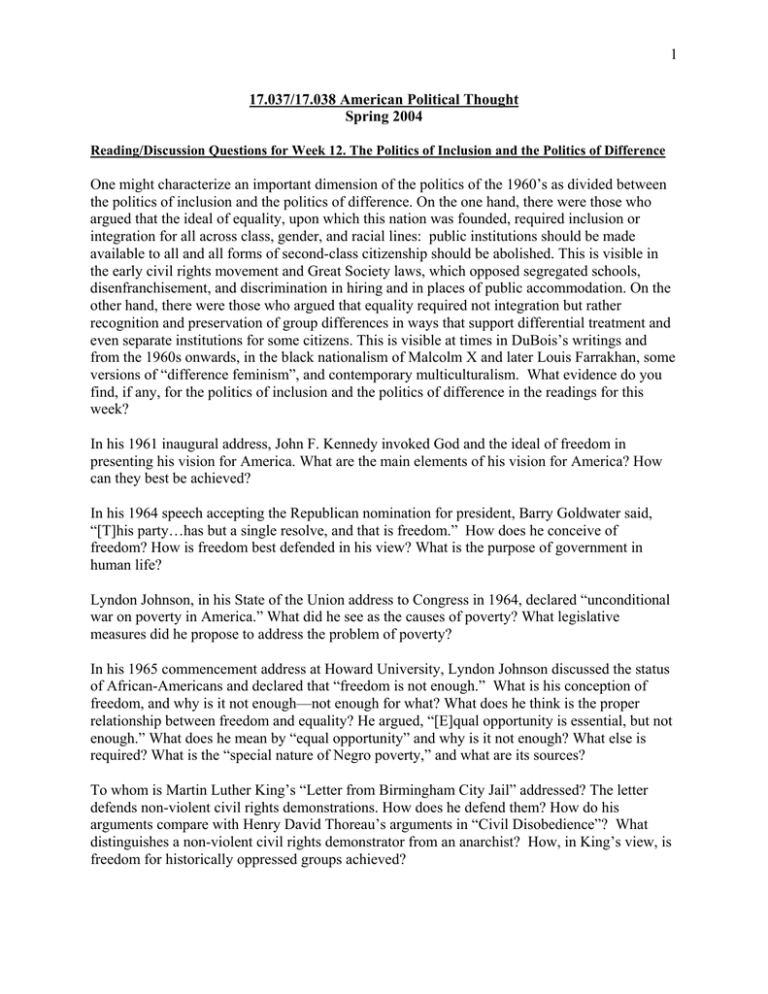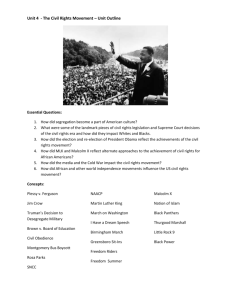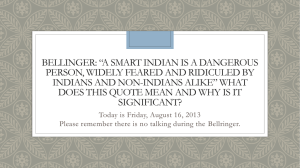1 One might characterize an important dimension of the politics of... the politics of inclusion and the politics of difference. On...
advertisement

1 17.037/17.038 American Political Thought Spring 2004 Reading/Discussion Questions for Week 12. The Politics of Inclusion and the Politics of Difference One might characterize an important dimension of the politics of the 1960’s as divided between the politics of inclusion and the politics of difference. On the one hand, there were those who argued that the ideal of equality, upon which this nation was founded, required inclusion or integration for all across class, gender, and racial lines: public institutions should be made available to all and all forms of second-class citizenship should be abolished. This is visible in the early civil rights movement and Great Society laws, which opposed segregated schools, disenfranchisement, and discrimination in hiring and in places of public accommodation. On the other hand, there were those who argued that equality required not integration but rather recognition and preservation of group differences in ways that support differential treatment and even separate institutions for some citizens. This is visible at times in DuBois’s writings and from the 1960s onwards, in the black nationalism of Malcolm X and later Louis Farrakhan, some versions of “difference feminism”, and contemporary multiculturalism. What evidence do you find, if any, for the politics of inclusion and the politics of difference in the readings for this week? In his 1961 inaugural address, John F. Kennedy invoked God and the ideal of freedom in presenting his vision for America. What are the main elements of his vision for America? How can they best be achieved? In his 1964 speech accepting the Republican nomination for president, Barry Goldwater said, “[T]his party…has but a single resolve, and that is freedom.” How does he conceive of freedom? How is freedom best defended in his view? What is the purpose of government in human life? Lyndon Johnson, in his State of the Union address to Congress in 1964, declared “unconditional war on poverty in America.” What did he see as the causes of poverty? What legislative measures did he propose to address the problem of poverty? In his 1965 commencement address at Howard University, Lyndon Johnson discussed the status of African-Americans and declared that “freedom is not enough.” What is his conception of freedom, and why is it not enough—not enough for what? What does he think is the proper relationship between freedom and equality? He argued, “[E]qual opportunity is essential, but not enough.” What does he mean by “equal opportunity” and why is it not enough? What else is required? What is the “special nature of Negro poverty,” and what are its sources? To whom is Martin Luther King’s “Letter from Birmingham City Jail” addressed? The letter defends non-violent civil rights demonstrations. How does he defend them? How do his arguments compare with Henry David Thoreau’s arguments in “Civil Disobedience”? What distinguishes a non-violent civil rights demonstrator from an anarchist? How, in King’s view, is freedom for historically oppressed groups achieved? 2 Compare the following statements from King’s “Letter” and Malcolm X’s “The Ballot or the Bullet”: King: “We will reach the goal of freedom in Birmingham and all over the nation, because the goal of America is freedom. Abused and scorned as we may be, our destiny is tied up with the destiny of America.” Malcolm X: “No, I’m not an American. I’m one of the 22 million black people who are the victims of Americanism. One of the 22 million black people who are the victims of democracy, nothing but disguised hypocrisy…I don’t see an American dream; I seen an American nightmare.” As these quotations suggest, do you think that King was an “integrationist” and Malcolm X a “segregationist”? Based on your reading, do you think King and Malcolm X advocate radically different goals, as well as radically different means to achieve those goals? What are the central tenets of the political, economic, and social philosophy of black nationalism in Malcolm X’s view? He suggests expanding the civil rights struggle to “a higher level—to the level of human rights…tak[ing] the case of the black man in this country before the nations in the U.N.” Why does he see this strategy as advantageous? What is (or might one find to be) controversial about the content of the 1967 National Organization for Women’s “Bill of Rights”? What do contemporary “difference feminists” see as the central differences between men and women? What are the sources of these differences? In what ways are contemporary difference feminists like the nineteenth-century proponents of the separate-spheres ideology? To whom is difference feminism appealing, and why? In what ways does difference feminism advance the position of women in society? In what ways does it hinder the advancement of women’s position in Katha Pollitt’s view? What types of remedies, in addition to, say, government policies addressing political and economic disadvantages based on race, does Patricia Williams’s writing suggest we need to address the problem of racial inequality in America?






